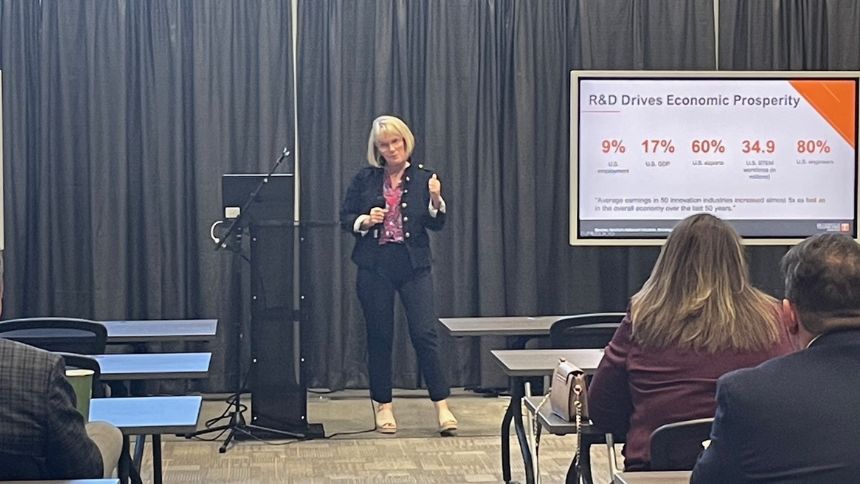
UTK driving research, innovation and economic development in five key areas
Deb Crawford shared those areas during a Knoxville Chamber Premier Partner event on Tuesday at the TN MADE facility.
Two days; two different topics of importance to the region that were spotlighted by the Knoxville Chamber.
As noted in Katelyn Biefeldt’s feature story in today’s edition of teknovation.biz, the topic on Tuesday was all about the emergence of East Tennessee as a hub for quantum technologies. On Wednesday, the focus was on how the University of Tennessee, Knoxville (UTK) is driving a research agenda that has significant economic development implications for the region and, for that matter, the State of Tennessee and nation.
Designed for the Chamber’s Premier Partners, the event featured Deb Crawford, Vice Chancellor of Research, Innovation and Economic Development. It drew a good crowd to the former Local Motors facility in the Hardin Valley area that now serves as the headquarters for TN MADE that houses advanced manufacturing technologies, equipment, and processes that create a competitive advantage for Tennessee companies in the defense, transportation, and advanced energy sectors.
In her presentation, Crawford talked about the three aspects of her title – research, innovation and economic development – and how the first two feed the third which is economic prosperity for the region and Volunteer State.
She noted that UTK has gone from $740 million in research proposal submissions five years ago to more than $1.2 billion last year. As a result, the return on investments in those proposals has resulted in nearly $400 million in funded research last year, up from $225 million five years ago.
Where is UTK focusing its priorities? Crawford mentioned five sectors, several clearly aligned with expertise at Oak Ridge National Laboratory. They are:
- Materials and manufacturing;
- Energy and environment;
- Future mobility;
- Artificial intelligence; and
- Human health and wellness.
What strategies is UTK employing to be more successful in grants going forward? Again, there are five which she described as the “5 x 5 solution”:
- Partnerships;
- Faculty cluster hiring;
- Academic program innovation;
- Innovation placemaking; and
- Entrepreneurship and new ventures.
Crawford also shared the challenges that Tennessee faces, some revealed in the Launch Tennessee-commissioned study by RTI International. While the state ranks #8 in the country in non-industry sponsored research, it is near the bottom – #43 – when it comes to industry R&D. The Volunteer State ranks #40 in terms of Small Business Innovation Research and Small Business Technology Transfer awards and only slightly better – #33 – in distribution of venture capital.
Like what you've read?
Forward to a friend!

